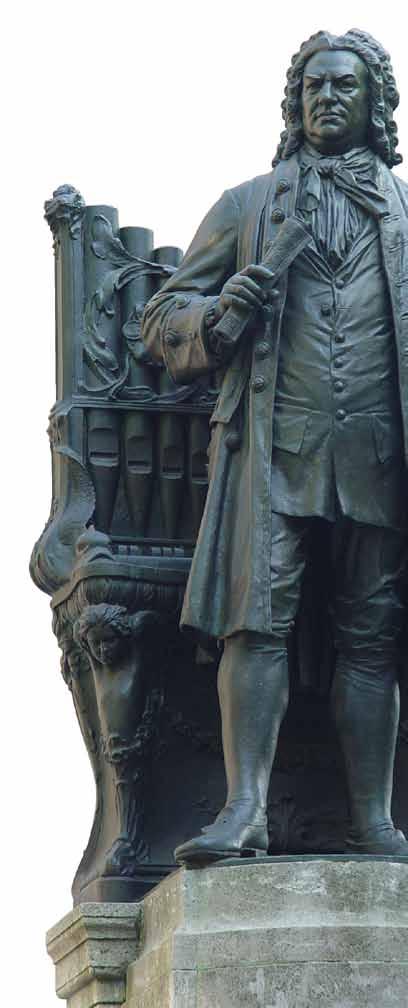
3 minute read
Back to Bach: Soli Deo Gloria
By Rev. Gaven M. Mize
It’s night and it’s quiet. It’s dead quiet, yet you aren’t quite sure you are ready to move toward your goal for the evening. Everyone else is asleep. You live with your brother because your parents unfortunately died early on in your life. Your brother can be very protective of his music because he holds it as sacred. So for you, it’s hands off. You creep stealthily upstairs. You listen at your brother’s door and you hear nothing but snoring. It’s time to put your plan into action. So, you move quietly through the dark night of the house because your heart’s desire is that precious to you. You creep into the music room, making sure the door doesn’t creak. You find the cabinet that you have been intently eyeing with musical need since you were very small. You’ve mastered all of your beginner’s music sheets and they are getting very boring. You slip your hand between the bars of the cabinet, roll up the precious sheets of music, and slip them through the bars. Now, all there is left for the night is to copy your brother’s sacred music onto a new piece of paper so you can play it later in secret, and then replace the original to its rightful place. If indeed this is you, then you are young Johann Sebastian Bach, part of a musically gifted family in 17th century Germany.
Advertisement

Bach had a love for music from his earliest years. He thought in notes, compiled ideas in chorus, and expressed himself in music to the glory of God alone. Even while young he once said, “I play the notes as they are written but it is God who makes the music.” With this mindset, Bach continued to trust in God that all his work would be sanctified by His glory alone. With his understanding of music as being God’s work and not man’s, Bach was able to reach great musical heights. In doing so, he composed and proclaimed God’s Word.
Bach began his first “real musical job” when he was 17 (about the age of many of the readers of this magazine). He was an organist in a Lutheran parish. Even though his family was very proud of him, his musical talent didn’t go over very well with the folks in the parish.
“People are complaining about your compositions,” the Lutheran priest said. “They are saying that your music is too showy and too proud.” This didn’t sit well with Bach and he held firm that the main purpose of his music was to “glorify God...and it comes from my heart as a humble gift to God.”
Some years after that first job of Bach’s youth he would continue to play for those who believed that his playing was too showy. However, that apparently wasn’t the case for the Duke Wilhelm Ernst in Weimar where Bach would play for royalty. After some time with the Duke, Bach wrote “Jesu, Joy of Man’s Desiring” which is one of the world’s most famous classical pieces.
From this point forward, wherever Bach went or whichever position he accepted he never let it slip out of his mind that he was playing for the glory of God. He once said, “The aim and final end of all music should be none other than the glory of God and the refreshment of the soul.” Dangling at the end of each composition that Bach wrote were the letters “SDG”. These letters were a summary of Bach’s mentality and faithfulness: Soli Deo Gloria. “To God alone be the Glory” was his constant motto and understanding. It is no coincidence that Soli Deo Gloria was one of the driving forces of the Reformation and still is a fundamental focus of the Church.

While much of Bach’s work was not recognized and appreciated until nearly a century after his death in 1750, we commemorate him as the predominate Lutheran kantor on July 28th each year. He faithfully served the four Lutheran churches in Leipzig, Germany during his last years. His roles as a kantor and as a magnificent composer remind us that we are rooted in the faith handed down by our fathers and that all talents, gifts, and even our everyday vocations are to be to the glory of God the Father, Son, and Holy Spirit.
And perhaps, just perhaps, there is a young person who will pick up this magazine at some point in time and read this article. That young person just might by inspired by Bach and desire to make the liturgy come alive through beautiful music. Perhaps, just perhaps, the next Bach is holding this magazine right now—one who is willing to foster his or her musical abilities in an effort to glorify God alone with music. Perhaps, that same person will hope to be a kantor one day and will help bring our church to its proper form that the spirit of the Reformation understands. To God alone be the glory!
Rev. Gaven M. Mize is the pastor of Augustana Evangelical Lutheran Church in Hickory, North Carolina.









